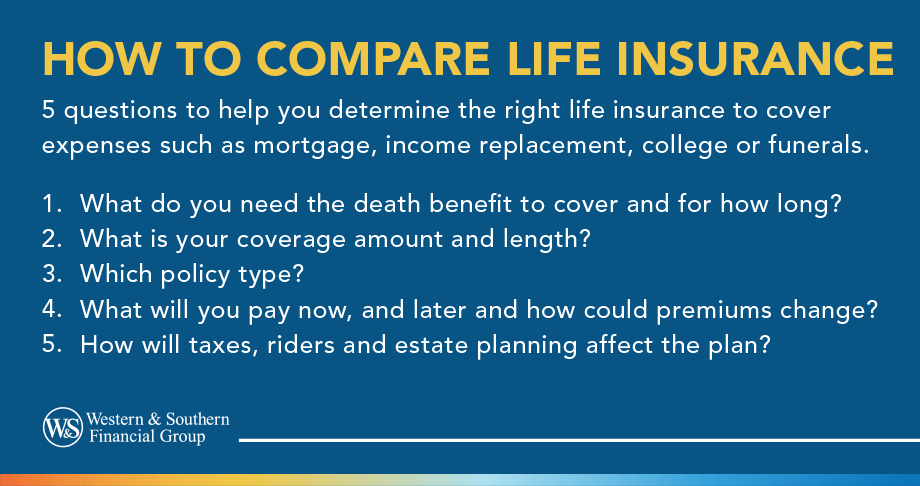Video Transcript
If you’re shopping for life insurance, the cheapest quote isn’t always the right policy. In the next few minutes, I’ll show you how to compare term, whole, and universal life, size your coverage, evaluate riders and conversion privileges, and avoid the most common mistakes - so your policy actually fits your goals and budget.
Term life is a policy designed to provide protection for a set period - often 10, 20, or 30 years. Premiums are typically low and there’s no cash value. The death benefit is designed for temporary needs like supplementing your income or covering mortgage or college costs. Look for term policies with convertibility, so you can switch to permanent coverage later without a new medical exam if needs change.
Whole life combines lifelong coverage (as long as premiums are paid) with cash value that grows at a guaranteed rate specified in the policy, and premiums stay level. With participating policies, dividends may be paid, though they’re not guaranteed.
Universal life is permanent insurance with adjustable premiums and, within limits, an adjustable death benefit. One variation is Indexed UL with cash value tied to market index performance and downside protection from market fluctuation through a minimum interest rate guarantee. While the policy’s cash value may be affected by changes in the index, it does not directly participate in the stock market. Another variation is Guaranteed UL geared mainly to the death benefit. Flexibility is powerful, but it requires active monitoring because fees and crediting rates affect long term performance.
When choosing between options, start with final expenses, which are around $8,300 for a funeral with a viewing and burial1, then add debts, income replacement, and future goals like college funding. Consider how long you want coverage relative to work years and longevity—average U.S. life expectancy is about 78.4 years (2023).2 Recheck coverage as life changes.
Keep in mind that riders customize protection. Here are a few examples: Waiver of Premium if you become disabled, Long Term Care riders that let you use part of the death benefit for long-term care covered expenses, and Guaranteed Insurability to buy more coverage at specific times without new underwriting.If you buy term, check the conversion window - often to age 65–70 - what permanent products you can convert into, and whether new premiums are based on your current age or original age. Also review the insurer’s financial strength ratings and understand standard limitations such as a two year contestability period and suicide exclusions.
Don’t focus on price alone - limited features and financial strength of carriers matter. Avoid buying too little coverage just to win a low premium, and remember inflation: $500,000 today probably won’t buy the same in 20 years. Finally, plan for what happens when term ends; consider conversion or layering coverage to match long term goals.
Start now, because waiting usually raises costs and health risks. Gather income, debts, and goals; compare term, whole, and universal side by side; ask how riders and taxes may apply; and work with a financial professional. Review regularly after major life changes. Visit WesternSouthern.com to explore tools and quotes.
1Statistics. National Funeral Directors Association. https://nfda.org/news/statistics.
2FastStats: Life Expectancy – CDC/National Center for Health Statistics. https://www.cdc.gov/nchs/fastats/life-expectancy.htm
Disclosures:
Increases in coverage are subject to new underwriting. Once the policy has renewed to annual renewal term rates, no conversion is allowed.
Life insurance policy guarantees are subject to the timely payment of premiums.
Loans will accrue interest. Loans and withdrawals may generate an income tax liability, reduce the Account Value and the Death Benefit, and may cause the policy to lapse. The policy may be issued as a Modified Endowment Contract (MEC) for tax purposes. Any withdrawals or surrenders could result in a taxable event.
Western & Southern Financial Group does not provide tax or legal advice. Please contact your tax or legal advisor regarding your situation. The information provided is for educational purposes only.
Payment of benefits under the life insurance policy is the obligation of, and is guaranteed by, the issuing company. Guarantees are based on the claims-paying ability of the issuer. Products are backed by the full financial strength of the issuing company
Key Takeaways
- Life insurance falls into two main categories: Term Life (affordable, temporary protection) and Permanent Life (lifelong coverage with cash value).
- To compare policies, consider riders, conversion, and the insurer's financial strength, not just price.
- Term, Whole, and Universal policies cater to diverse financial goals, from covering temporary debts to estate planning.
- Calculating the right coverage amount is crucial to ensure your death benefit can cover final expenses, replace lost income, and fund future goals, such as college.
- Avoid common pitfalls: insufficient coverage, prioritizing low premiums, and ignoring inflation's long-term effects.
Why You Can't Afford to Skip the Comparison Process
Life is unpredictable. That’s the entire premise behind insurance. And while the topic of a death benefit can be uncomfortable, the financial security it helps provide is a profound act of care for those you leave behind. Skipping the due diligence of comparing life insurance policies is like leaving money on the table, money your family could use.
Understanding the Life Insurance Landscape
Life insurance isn't one-size-fits-all. The marketplace offers various policy types, each tailored to different financial goals and circumstances. At its core, the decision often boils down to two main categories: term and permanent. Understanding their fundamental differences is the first significant step when comparing life insurance.
Term Life Insurance: Straightforward Protection
Term life insurance provides coverage for a specific period, typically 10, 20, or 30 years. Think of it as renting protection.
How it works: You pay premium payments for the coverage length you select. If you pass away during the term, your beneficiaries receive the death benefit. If you outlive the policy, coverage ends.
The appeal: Term products deliver maximum coverage for minimal cost. That's pure protection without complications.
Key considerations:
- No cash value accumulation
- Premium rates lock in at purchase
- Convertibility options are often available
- Ideal for temporary financial obligations like mortgages or college expenses
Whole Life Insurance: The Long-Term Commitment
Whole life insurance is a type of permanent policy that combines lifelong coverage with a savings component. Your premium payments remain level, and the policy builds cash value over time.
The structure: A portion of each premium is allocated toward insurance costs, while the remainder accumulates cash value that grows on a tax-deferred basis.1 As long as you pay premiums, coverage continues regardless of age or health changes.
Real-world application: Sarah, 40, purchased a $250,000 whole life policy. After 20 years, she'll have a guaranteed cash value that she can take a loan against for emergencies or supplement her retirement income while maintaining her death benefit.
What to weigh:
- Higher premiums than term
- Guaranteed cash value growth, though modest returns
- Dividend potential with participating policies
- Coverage lasts your entire lifetime
Universal Life Insurance: Flexibility Meets Permanence
Universal life insurance is a type of permanent life insurance that offers adjustable premiums and death benefits within certain limits. It's permanent coverage with more moving parts.
The mechanics: Your premium payments are deposited into a cash value account that earns interest. The insurer deducts mortality charges and fees monthly. You can adjust death benefits and premiums, though changes affect long-term performance.
Popular variations:
- Indexed Universal Life (IUL): Cash value tied to market index performance with downside protection. While the policy’s cash value may be affected by changes in the index, it does not directly participate in the stock market. The policy’s cash value is subject to charges, which may reduce it even if the index does not decline.
- Guaranteed Universal Life (GUL): Focuses on the death benefit with minimal cash value
- Variable Universal Life (VUL): Allows investment in sub-accounts similar to mutual funds
Compare Policy Types Head-to-Head
| Feature | Term Life Insurance | Whole Life Insurance | Universal Life Insurance |
|---|---|---|---|
| Coverage Period | Fixed term (e.g., 10, 20, 30 years) | Your entire lifetime | Your entire lifetime |
| Premium Payments | Fixed and lowest cost | Fixed and significantly higher | Flexible, can be adjusted |
| Cash Value | No | Yes, guaranteed growth | Yes, growth often tied to interest rates |
| Primary Goal | Affordable income replacement for a set period | Lifelong coverage, estate planning, forced savings | Lifelong coverage with premium/death benefit flexibility |
Additional Product Comparisons
How to Compare Life Insurance: A Practical Framework
When you compare life insurance, organize your decision around five questions:
- What financial obligations do you need the death benefit to cover and for how long? (mortgage, income replacement, college, final expenses)
- How much coverage amount do you need, and what coverage length fits?
- Which policy type (Term Life, Whole Life Insurance, or Universal Life) best aligns with your goals?
- What will you pay now, and later and how could premiums change?
- How will taxes, riders (e.g., Long Term Care), and estate planning affect the plan?
Coverage Amount: Getting the Calculation Right
The right coverage amount strikes a balance between adequate protection and premium affordability. A Life Insurance Calculator can refine these estimates based on your specific financial obligations, existing assets, and family structure.
Consider final expenses (typically $7,000-$12,000), outstanding debts, income replacement needs, and future goals such as college funding. Your coverage amount should evolve as circumstances change.
Calculator
Get a clearer picture of your coverage needs with our life insurance calculator to see how factors like income, family size, and long-term obligations shape your ideal policy amount.
Comparing Policy Features: The Details That Differentiate
Beyond basic coverage, policy features significantly impact value and flexibility.
Riders: Customizing Your Protection
Riders add specific benefits for an additional cost. Common valuable options:
Accelerated Death Benefit: Access to the death benefit if diagnosed with terminal illness. Provides funds for medical care or final wishes. Payment of Accelerated Death Benefits will reduce the Death Benefit and may affect other policy values. Receipt of benefits may adversely affect eligibility for Medicaid or other government benefits. This rider is not intended to be a qualified long-term care insurance contract under Section 7702(b) of the Internal Revenue Code.
Waiver of Premium: Continues coverage if you become disabled and can't work. Premiums are waived as long as the policy remains in force.
Long Term Care Rider: Allows using the death benefit for long-term care expenses. Particularly valuable as standalone long-term care insurance becomes expensive.
Guaranteed Insurability: Purchase additional coverage at specific life events without new medical underwriting. Protects against future health changes.2
Conversion Privileges: Keeping Options Open
Many term policies include conversion rights, which allow you to switch to permanent coverage without undergoing a medical exam. This provision proves invaluable if health deteriorates.
What to verify:
- Conversion window (often until age 65-70)
- Which permanent policies can you convert to
- Whether premiums will be based on current age or original age
- Any limitations on coverage amounts
Real-World Comparisons (Case Studies)
Case 1: Growing family, budget-first:
- Profile: Age 35, two kids, mortgage, single income.
- Goal: Maximize death benefit during highest-need years.
- Fit: 25- or 30-year term products for income replacement + term rider for mortgage. Add a conversion option for flexibility if goals change.
- Trade-offs: Lowest cost today; no cash value; expires after term unless converted.
Case 2: Lifetime legacy & discipline:
- Profile: Age 45, high savings rate, wants guaranteed legacy and forced savings.
- Fit: Whole life insurance with paid-up additions for long-run guarantees and predictable premium payments.
- Trade-offs: Higher cost; less flexible than universal life; a long-term horizon is essential to justify internal returns.
Case 3: Flexible plan with moving parts:
- Profile: Age 50, business owner seeking lifetime coverage and flexibility as income fluctuates.
- Fit: Universal life (fixed or indexed) with carefully designed premiums and targeted no-lapse guarantees.
- Trade-offs: Requires periodic review; missed or low premiums could erode cash value and threaten coverage later.
Common Pitfalls When Comparing Policies
Focusing solely on price. The cheapest premium might come from a financially weak insurer, include limited features, or be an insurance company with poor customer service. Balance cost against value and reliability.
Overlooking policy exclusions. Most policies exclude suicide within the first two years and may have contestability periods. Understand limitations upfront.
Buying inadequate coverage. Underinsuring to save money defeats the purpose. Your family faces the full financial burden you intended to protect against.
Dismissing a company's financial strength ratings. You are purchasing a promise that a company will be available to pay a claim many years from now. Check their rating from agencies like A.M. Best.
Ignoring inflation. $500,000 in coverage today won't have the same purchasing power in 20 years. Consider higher coverage amounts or policies with increasing death benefits.

Taking Action: Your Next Steps
Comparing life insurance transforms from overwhelming to manageable when you follow a systematic approach:
Start now. Each year you delay, costs increase in premiums and risks health changes that complicate approval.
Gather personal information. Know your income, debts, financial obligations, and coverage needs before requesting quotes.
Work With a Financial Professional. Life insurance agents understand underwriting nuances and can position your application optimally and provide you with life insurance quotes.
Ask questions. Clarify anything you don't understand about policy terms, premium payments, or the application process.
Review regularly. Life changes, such as marriage, having children, purchasing a home, and career advancement should trigger coverage reviews.
Life insurance represents one of the most important financial decisions you'll make. Taking the time to thoroughly compare life insurance options ensures that your family receives the protection they need at a price you can afford.
Let a professional help you compare life insurance for your unique goals. Request a Free Life Insurance Quote
Frequently Asked Questions
Should I choose term or permanent life insurance?
Can I have multiple life insurance policies?
How do pre-existing medical conditions affect my rates?
How often should I compare life insurance policies?
It’s wise to review your life insurance needs every few years or after a major life event, such as getting married, having a child, or buying a home. You may not need to switch policies, but you should confirm your coverage amount is still adequate.
If you've significantly improved your health (e.g., quit smoking or lost a substantial amount of weight), you may qualify for lower rates and should absolutely get new life quotes.
Sources
- Publication 525 (Taxable and Nontaxable Income) – Internal Revenue Service (IRS). https://www.irs.gov/publications/p525
- FastStats: Life Expectancy – CDC/National Center for Health Statistics. https://www.cdc.gov/nchs/fastats/life-expectancy.htm













